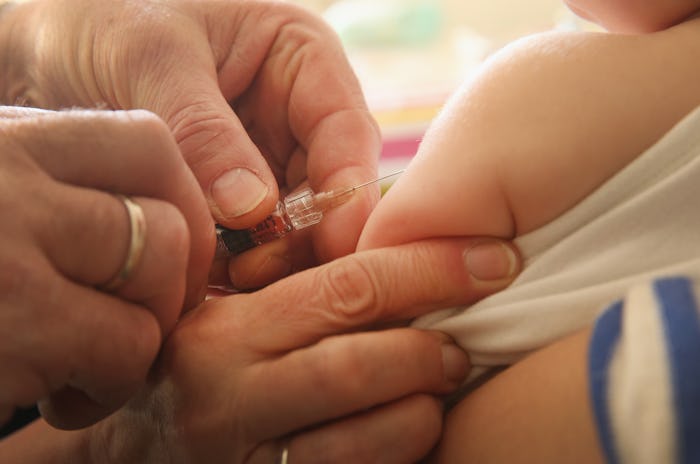Life

Arizona May Make It Even Easier For Parents To Opt Out Of Vaccines For Their Kids
At a time when states are seeing the return of vaccine-preventable diseases like the measles, it seems reasonable to think that governments might want to start cracking down on low immunization rates in a bid to reduce the risk of future outbreaks. But in Arizona, it appears that the opposite is actually happening. Thanks to a series of bills passed in the House this past Thursday, the state of Arizona may expand vaccine exemptions with new legislation, according to The Arizona Republic, despite warnings from the medical community that there will likely be serious public health implications.
The Republican-led House passed a 5-4 vote in favor of three bills that would make it easier for Arizona parents to opt of out vaccinating their children in a number of ways, according to The Hill. For one, as The Arizona Republic explained, while parents in Arizona already have the option to claim an exemption due to religious belief or on medical grounds, the new legislation would remove the current rule requiring parents to sign a state health department exemption form warning them of the risks involved with that decision. In addition, according to The Hill, the exemptions would also be expanded to allow preschoolers, not just school-age children.
But that's not all. According to Forbes, other controversial provisions covered by the three bills include requiring doctors to offer parents the option of having an "antibody titler" blood test to determine immunity — something American Academy of Pediatrics-affiliated Arizona pediatrician Dr. Elizabeth McKenna told the House committee was "unreliable and difficult to interpret," The Arizona Republic reported.
According to the Arizona Daily Star, doctors would also have to abide by new rules concerning informed consent, which require parents to be provided with an additional 30 pages of information about vaccines, including expanded information about ingredients, potential risks, and how to file a complaint in the case of a "vaccine injury."
Yet while that may seem like a well-intentioned move meant to protect parents and children, critics, like Phoenix physician Dr. Steven Brown, according to Tucson.com, argued that all it will really do is create further fear-mongering and misinformation by implying that vaccines are far more dangerous than they actually are. Furthermore, the American Medical Association's Dr. Steve Barclay told lawmakers that the legislation would increase the likelihood that other vaccine-preventable diseases, like polio, will start to reappear, according to The Arizona Tribune.
Prior to the House vote, the committee heard from anti-vaxx advocates, who were given "two uninterrupted hours" to discuss their views, according to Tucson.com. Despite that, though, Phoenix Rep. Nancy Barto, who sponsored the bills, claimed that she didn't actually view the proposed legislation as "anti-vaccine bills," but instead as "discussions about fundamental individual rights."
The problem, of course, is that viewing vaccination as an issue of individual rights completely ignores the very real impact it has on public health. Phoenix physician Dr. Joseph Seelbaugh noted, according to Tucson.com, that while the committee heard the viewpoints of families who were against vaccines, they hadn't been given the opportunity to hear from families who have had children actually suffer from vaccine-preventable illnesses.
Just as importantly though, Seelbaugh said they also missed out on the chance to hear from parents of immunocompromised children, who would now have to live with the fear of their kids contracting potentially life-threatening diseases because the community vaccination rates aren't high enough to provide protection for those unable to be vaccinated.
But the idea of low vaccination rates contributing to disease outbreaks isn't even just a hypothetical conversation. According to the Centers for Disease Control and Prevention, three states — New York, Texas, and Washington — are currently facing measles outbreaks, and in 2019 alone, 127 individual cases of measles have been confirmed in 10 different states, including California, Colorado, Connecticut, Georgia, Illinois, Kentucky, and Oregon.
In fact, the measles outbreak in Washington has caused so much concern that a state Senate committee voted 7-4 Friday to pass a measure that would prevent parents from claiming personal or philosophical exemptions from vaccines on behalf of their children, according to The Tacoma News Tribune. And it's not the only state to have cracked down on exemptions following outbreaks: the outlet noted that both California and Vermont similarly removed personal belief vaccine exemptions in 2015 following measles outbreaks.
Given the potential for serious health complications as a result of diseases that shouldn't even particularly exist anymore in the United States, it does certainly seem concerning that Arizona would be moving to make it easier for parents to opt-out of childhood vaccines. And given that the move has come at a time when other states are seeing outbreaks due to low immunization rates, it makes a lot of sense that doctors and medical experts in the state are worried about the outcome.